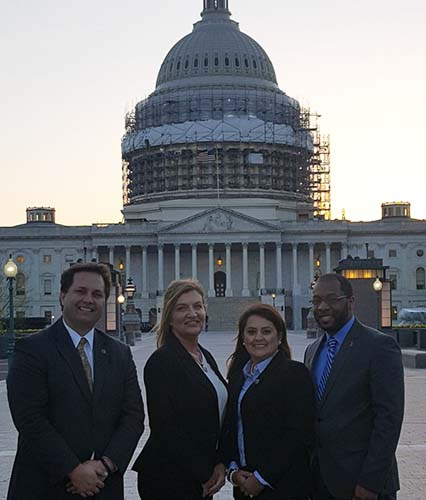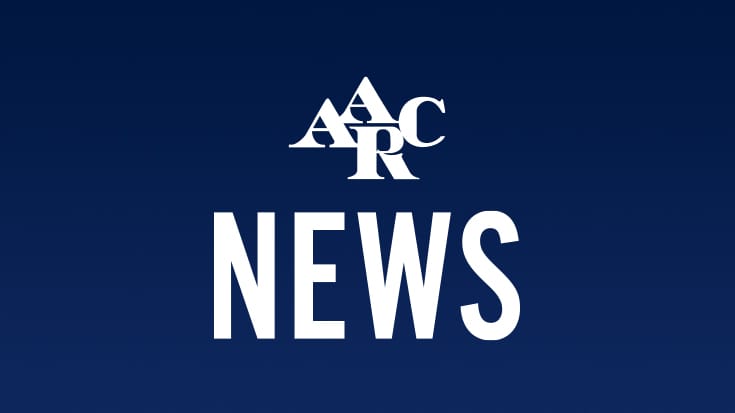 Florida Society for Respiratory Care leaders Jamy Chulak, Angel Davis, Suhey Tuckler, and Antwan Brooks joined 130 PACT reps on April 12 to support the telehealth bill.
Florida Society for Respiratory Care leaders Jamy Chulak, Angel Davis, Suhey Tuckler, and Antwan Brooks joined 130 PACT reps on April 12 to support the telehealth bill.The AARC asked respiratory therapists to support its annual trek up Capitol Hill on April 12 to lobby Congress on HR 2948, the Medicare Telehealth Parity Act, and the response was amazing. Not only did 130 members of the Association’s Political Advocacy Contact Team (PACT) make the trip to DC to visit with their members of Congress, thousands of other therapists joined physicians, caregivers, and others in writing in support of the major legislation being supported by the PACT during our Virtual Lobby Week.
“Overall we sent just shy of 40,000 messages to members of Congress during the week,” says AARC President Frank Salvatore, MBA, RRT, FAARC. “That’s the best we’ve ever done.”
All that support paid off big time. Within 48 hours of the PACT trip, the number of Congressional co-sponsors of HR 2948 jumped by 14, something Salvatore credits not just to the PACT visits on the 12th, but to those thousands and thousands of therapists who took time out of their busy schedules to contact their own members of Congress before the day even dawned. Additional co-sponsors have signed on since, bringing the total to 49 (as of May 6).
“It was definitely a combined effort,” says the AARC president.
We’re Not Going It Alone
AARC Director of Government Affairs Cheryl West believes the impressive support for the legislation seen during this year’s lobby event bodes well for eventual passage of the bill. The fact that the bill is not directed only at RTs is making a difference too. “We are advocating for a bill that has bipartisan support — a rarity in Congress,” says West. “There are also numerous other organizations and associations that support it, so we’re not going it alone.”
Evidence of that outside support was clearly visible as PACT members made their way into Congressional offices on the Hill. Representatives from the Alliance for Patient Safety were on hand to support the RT cause and share their latest white paper on Improving Access to Respiratory Care (written by a working group that included a number of AARC members). Allergy and Asthma Network President and CEO Tonya Winders, MBA, and her new director of advocacy, Charmayne Anderson, were also there to support the initiative.
Our new lobbyists, Katie Schubert and Erica Miller, from CRD Associates, worked hard on behalf of the AARC as well. Both are former Congressional staff members and spoke to the assembled group at the Monday briefing about how Capitol Hill is addressing issues this spring and the potential schedule for the rest of the year. They both provided suggestions on the best points to relay during the Hill meetings in order to grab the attention of the Congressional member or staff.
But it was the 130 PACT members, who together represented 44 states and the District of Columbia, who did the lion’s share of the heavy lifting during the day. All told, they visited more than 310 Congressional offices, sharing information about HR 2948 with their members of Congress and/or their health staffs.
Patients’ Stories Make A Big Impact
About a half dozen states brought a patient along for the ride as well. California is one example.
“Kenneth Benson is a stage three COPD patient,” says California Society for Respiratory Care President Michael Madison, MBA, RRT, who represented the state along with Russell McCord, RRT-NPS, RPFT, Patrick Moore, BHA, RRT, and Ricardo Guzman, MA, RRT. “He is a patient in the Kaiser Healthcare System and has already benefitted from access to care and follow up care through telehealth modalities, primarily phone call follow ups.”
Madison says Benson went with him on eight of their scheduled meetings and was a real trooper, despite carrying a pulse oxygen concentrator with him. “Ken spoke very eloquently about his personal story in each of our meetings … there were actually times when we had a hard time keeping up with him.
 California Society for Respiratory Care PACT reps and patient Kenneth Benson (center-right) meet with California Representative Thompson’s staff (right) to discuss telehealth legislation.
California Society for Respiratory Care PACT reps and patient Kenneth Benson (center-right) meet with California Representative Thompson’s staff (right) to discuss telehealth legislation.
At each visit, he talked about his battle to quit smoking and how having an RT assign him to a smoking cessation program was the only way he was able to quit. He also spoke about the telehealth services he continues to receives and how they are helping him keep his COPD under good control. “The telehealth system at Kaiser allows him to send an email with questions and quickly get detailed answers to his questions, which ultimately helps him better — and successfully — manage his COPD,” says Madison.
“Patients always pack a powerful punch with legislators, as they are living the situation, as it were,” stresses Cheryl West. “And they always note how important RTs are for them to maintain their quality of life. We all know that, but it’s far better when a patient says it and not the RT.”
Bigger And Better
Several states came with students in tow as well, giving them a great opportunity to see advocacy in their new profession at work, and members of the Florida delegation got a special treat when one of their Congressmen invited them to sit in the gallery of the House and watch the proceedings.
“The AARC’s annual Capitol Hill Lobby Day just seems to get bigger and better every year,” says West, “and this year was no exception.” Building on the success of previous years, the Association made firm inroads with Congressional members from coast to coast, who now recognize not only what an RT is and does, but also the value therapists add to the health care system as a whole.
“We want to thank all of the PACT members who made the trip in 2016, and all of the therapists out there who wrote in support of the telehealth legislation during our Virtual Lobby Week,” says Frank Salvatore. “Their support helped to pave the way for our PACT members, and those members did a great job of sealing the deal and acquiring additional co-sponsors for HR 2948.”
Want to see more great coverage of our 2016 Capitol Hill Lobby Day? Head over to Twitter.
Want to learn more about the Medicare Telehealth Parity Act and what it could mean to RTs? Check out our HR 2948 FAQs.
Email newsroom@aarc.org with questions or comments, we’d love to hear from you.













